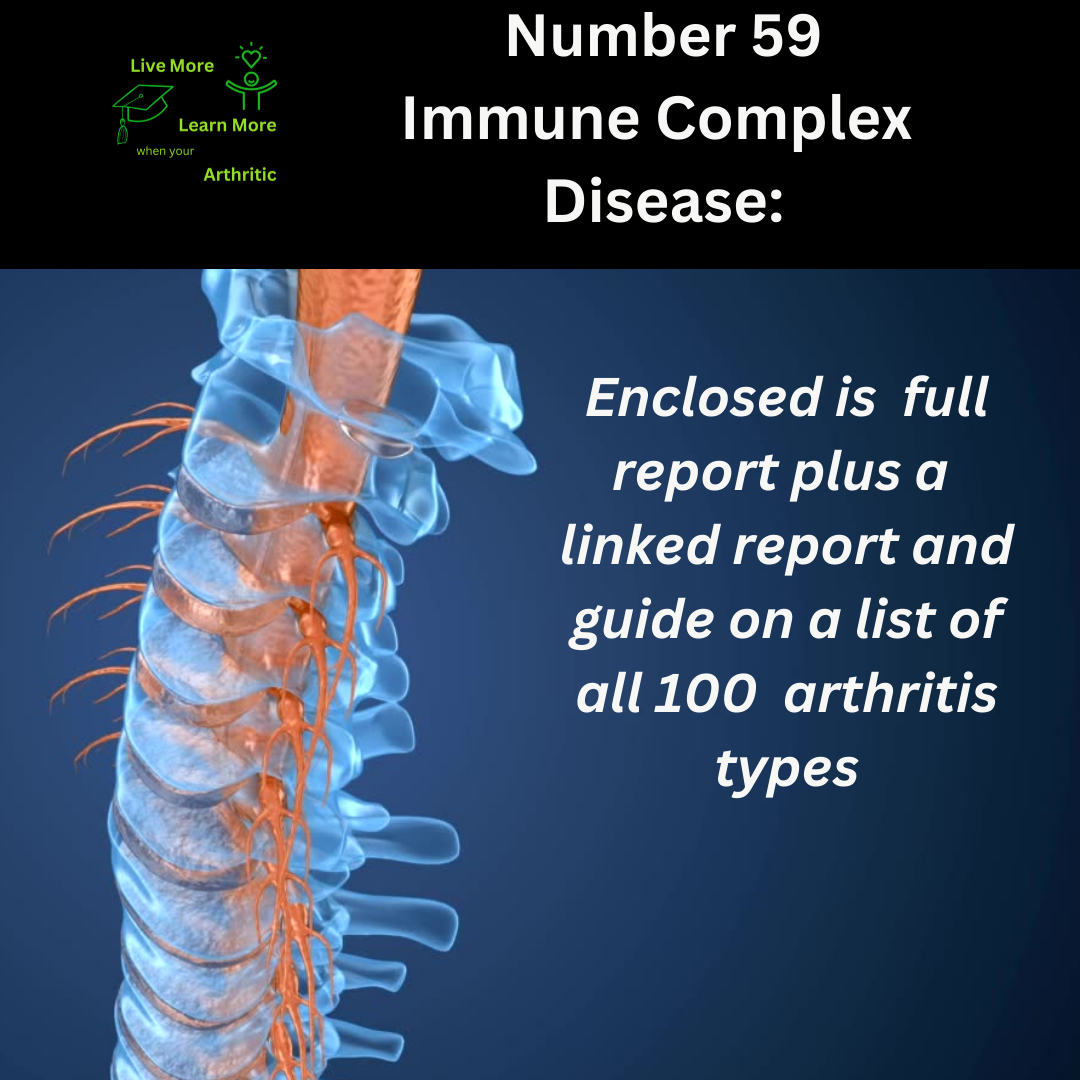
Immune Complex Disease: Number 59 on the list of 100 types of Arthritis
Navigating Immune Complex Disease: Embracing Resilience and Hope
In the intricate tapestry of human health, immune complex diseases weave a complex narrative—a story of immune system dysregulation, clinical manifestations, and the pursuit of quality of life. Let’s embark on a journey to unravel the mysteries of immune complex diseases, understanding their impact and the pathways to resilience.
 Unveiling Immune Complex Disease
Unveiling Immune Complex Disease
Imagine a condition where the immune system, designed to protect the body, turns against its own tissues, creating a symphony of inflammation and dysfunction. Immune complex diseases encompass a group of disorders characterized by the formation of immune complexes—antigen-antibody clusters—that trigger systemic inflammation and tissue damage.
Description of the Disease
Immune complex diseases encompass a spectrum of conditions, including systemic lupus erythematosus (SLE), rheumatoid arthritis (RA), and certain types of vasculitis. These diseases arise from a combination of genetic predisposition and environmental triggers that lead to abnormal immune responses.
Causes and Triggers
The underlying causes of immune complex diseases are multifactorial, involving genetic susceptibility, environmental factors (such as infections or toxins), and dysregulated immune pathways. Triggers such as stress, infections, or hormonal changes can precipitate disease flares and exacerbate symptoms.
Symptoms and Impact on Quality of Life
Symptoms of immune complex diseases vary widely but often include joint pain, skin rashes, fatigue, and organ involvement (e.g., kidney or lung inflammation). Limited range of motion in affected joints can significantly impair mobility and daily activities, impacting quality of life.
Age of Onset and Lifespan Considerations
The age of onset for immune complex diseases varies depending on the specific condition. While some diseases like juvenile idiopathic arthritis (JIA) present in childhood or adolescence, others such as SLE or RA may manifest in early adulthood. With appropriate management, many individuals can lead fulfilling lives; however, chronic inflammation and organ damage can affect long-term outcomes.
Achieving Quality of Life with a Proactive Approach
A proactive approach to managing immune complex diseases involves early diagnosis, regular medical monitoring, and lifestyle modifications. Maintaining a balanced diet, engaging in regular exercise, managing stress, and adhering to prescribed treatments can help optimize health and minimize disease flares.
 Possible Complications and Breakthroughs
Possible Complications and Breakthroughs
Complications of immune complex diseases may include progressive joint damage, organ dysfunction (e.g., kidney failure), increased risk of infections, and cardiovascular complications. Natural therapies such as dietary supplements (e.g., omega-3 fatty acids), acupuncture, and mindfulness-based practices may complement conventional treatments and support overall well-being.
Demographics and Gender Disparities
Certain immune complex diseases like SLE and RA have a higher prevalence in women compared to men, suggesting a potential role for hormonal influences in disease pathogenesis. However, immune complex diseases can affect individuals of all ages and genders, underscoring the importance of tailored approaches to diagnosis and management.
Interconnected Health Considerations
Individuals with immune complex diseases should be aware of potential interconnected conditions, such as osteoporosis (due to chronic inflammation and corticosteroid use), cardiovascular disease, and depression. Comprehensive care involving specialists in rheumatology, nephrology, dermatology, and cardiology is essential to address the diverse health needs of affected individuals.
In essence, navigating immune complex diseases requires resilience, collaboration, and a holistic approach to wellness. By embracing proactive strategies, leveraging scientific advancements, and fostering community support, individuals affected by these conditions can rewrite their health narrative, embracing hope and empowerment on their journey toward better health and quality of life.